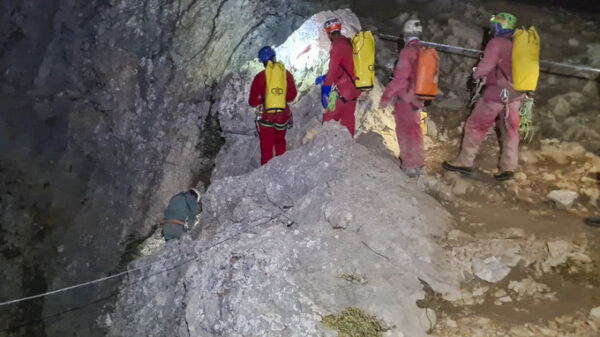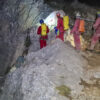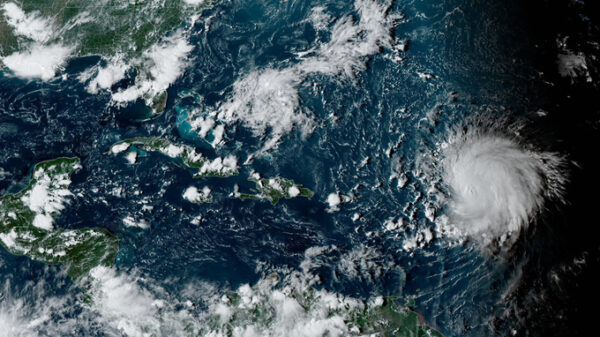BEIJING (AP) — Heavy rain and high water levels on rivers in northeastern China were threatening cities downstream on Friday, prompting the evacuation of thousands, although the country appears to have averted the worst effects of the typhoon season battering parts of east Asia.
Hebei province surrounding the capital Beijing on three sides issued alerts for several of its cities. The province of Heilongjiang to the north, was evacuating entire villages in anticipation of life-threatening deluges.
Rescue work remains underway. At least 20 people have been reported killed in Beijing’s outer suburbs and another 27 were missing following the weekend storms that quickly overwhelmed drainage systems.
Beijing usually has dry summers, but had a stretch of record-breaking heat this year that broke dramatically over the weekend with almost a week of constant rain and drizzle. Power was knocked out in areas, public transport and summer classes were suspended and citizens of the metropolis of more than 20 million were told to stay home.
The nearby cities of Tianjin and Zhuozhou were also hit hard. Fire services aided by volunteer rescue groups searched apartment buildings and railway tunnels for stranded people, bringing hundreds to safety.
With it’s status as the nation’s capital, the headquarters of the ruling Communist Party and home to cultural treasures such as the ancient Forbidden City, Beijing has provided special protection from flooding through the diversion of waters to neighboring regions. That sparked complaints on social media Friday of flooding in surrounding areas that could allegedly have been avoided if the rainwater had been flushed through the capital’s system of canals and rivers.
Other regions, especially in China’s south, have suffered unusual deadly summer flooding. Other parts of the country are struggling with drought, putting further pressure on food supplies for the nation’s 1.4 billion people already struggling with the disruption in grain shipments resulting from Russia’s war against Ukraine.
Muddy water surging down streets washed away cars in the hilly Mentougou district on Beijing’s western edge.
“A couple of cars parked behind my apartment building disappeared in just one minute,” said resident Liu Shuanbao.
In Zhuozhou, southwest of Beijing, some 125,000 people from high-risk areas were moved to shelters, Xinhua said.
President Xi Jinping issued an order for local governments to go “all out” to rescue those trapped and minimize loss of life and property damage.
The government of Tianjin, a port east of Beijing, said 35,000 people were evacuated from near the swollen Yongding River.
As much as 500 millimeters (almost 20 inches) of rain has fallen in some places since Saturday, according to the Hebei province weather agency. Some areas reported as much as 90 millimeters (3 1/2 inches) of rainfall per hour.
Some 13 rivers exceeded warning levels in the Haihe Basin, which includes Beijing, Tianjin and Shijiazhuang, Xinhua said, citing the Ministry of Water Resources.
About 42,000 people were evacuated from areas of Shanxi province to Hebei’s west, it reported, citing emergency officials.
In early July, at least 15 people were killed by floods in the southwestern region of Chongqing, and about 5,590 people in the far northwestern province of Liaoning had to be evacuated. In the central province of Hubei, rainstorms trapped residents in their vehicles and homes.
China’s deadliest and most destructive floods in recent history were in 1998, when 4,150 people died, most of them along the Yangtze River.
In 2021, more than 300 people died in flooding in the central province of Henan. Record rainfall inundated the provincial capital of Zhengzhou on July 20 that year, turning streets into rushing rivers and flooding at least part of a subway line, trapping passengers in the cars.
Meanwhile, in the eastern Shandong province, authorities also warned of flooding risks as water levels on the Zhangwei River continued to rise.
China was largely spared by Typhoon Khanun, which on Thursday lashed Japan, damaging homes and knocking out power on Okinawa and other islands. China’s National Meteorological Center had initially expected the typhoon to make landfall in the southeastern Zhejiang province, where local authorities called ships into port and halted passenger ferry services.
Copyright 2021 Associated Press. All rights reserved.




























